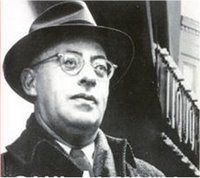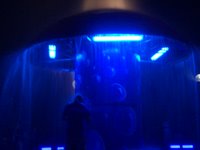I don't even know where to start to e-ruminate on this past weekend staying with AH, ES and crossing trails with a cast of characters I don't think I could have possibly imagined before meeting. I need some time to recover before I decide what I want to write .... maybe I'll sleep. Haven't done that in a while.
Take a moment to read this NPR article (http://www.npr.org/templates/story/story.php?storyId=5495373), written by the aforementioned AH; living in Indianola, where I'll be teaching, and teaching himself not too far away. Good guy, plays a mean harmonica.
Below is my focus paper - very open ended, our choice of topic as long as it's thesis is a relatively close cousin to the subject of education. I remembered talking about Highlander (http://www.highlandercenter.org/) withProf. Willingham last year, and seriously considering making the trek to Tennessee to enroll in one of their workshops after undergrad, so I started out laaaaate last night with that in mind. That gradually evolved, as the hours ticked towards dawn, into a more broad look at teaching for social change, or popular education, in the Highlander model; specifically, a closer look at several of the key players in its inception. I had some books on Myles Horton and, in a dorm filled with liberal-minded wannabe teachers from up north who are fixin' to "enlighten" the dirty south (count me in), it wasn't hard to find plenty of material on Freire. Alinsky is the anvil of the three, a Chicago gangster with an impeccable conscience - and was more focused with self-education rather than buying into the ideological, and fundamentally politically driven, system of education in the United States at all. Kareem you'd be proud.
Popular education is an educational technique designed to raise the consciousness of its participants and allow them to become more aware of how an individual's personal experiences are connected to larger societal problems. Participants are empowered to act to effect change on the problems that affect them (gotta love wikipedia).
Conscientizacao
The Awakening of Critical Consciousness
In Educational Forums
~ Horton, Alinksy & Freire ~
EDSE 500: Principles of Secondary Classroom Instruction
6.26.06
Historically there has been a direct relationship between social class and knowledge or opportunity, both in this country and even more apparently on an international scale, which continues to exist today in multiple manifestations. The work of leading educational activists for social justice such as Saul Alinsky, Myles Horton and Paulo Freire has shown just how implicitly “people’s knowledge and understanding of the world is the consequence of their education, regardless of its source”.[i] However, the distribution and direction of this knowledge, or lack thereof, is severely disproportional and most often dogmatic. That being said, the burden of breaching this gap between ignorance and enlightenment falls squarely on the shoulders of the educators who either work to promote existing institutional ideologies or provoke original thought and critical observation. Alinksy, Horton and Freire each have dedicated their life to the latter. Yet there also exists an “impulse for people to invent their own identities and realities”[ii] and a drive towards “personal and social liberation”[iii] which, when coupled with liberating pedagogy, can “give community people sufficient sense of their own dignity and power so that they can argue on their behalf”[iv] and truly bring about changes that will directly answer to their specific, individual needs. If education plays such a central role in shaping the society we share, then it is important to ask the same questions that those three prominent figures have asked themselves; “what kind of education, to what end, and in whose interest?”[v]
Educating for social change in America saw its beginnings in the labor college movement following World War I, when soldiers returned from Europe with worker’s educational program models in mind. The majority of the working class, primarily immigrants, found the public school system inadequately provided opportunities for the upward social mobility that our democratic structure promised and thus created American Labor Colleges “to facilitate fundamental social change on behalf of ordinary citizens.”[vi] Similarly, Alinsky organized lower-income working-class Americans around unions in urban centers throughout the country in order to gain and maintain leverage in political forums. With the prevalence of racism and sexism in this country, many other disadvantaged and discriminated against communities, generally poor and minority, likewise sought to provide educational opportunities with a social center of interest. The Highlander Center in Tennessee, “a school meant to prepare potential activists to bring about radical social change”[vii] which was founded by Horton during the civil rights movement, pioneered this growing movement of “popular education and participatory research” through experimental education for social transformation in both practice and theory. By providing the tools and capacity for underprivileged communities in the South to organize around this central ideology of progressive thinking, Highlander educators facilitated radical democratic shifts in awareness, comprehension and ultimately action. In Brazil, Freire was following a path akin to his contemporaries in the North, establishing educational practices for poor rural families and laborers that beseeched its students to think critically of their social situation and embrace democratic reform.
As organization proves necessary, then so to is an ongoing critique of the players involved and their motivations for organizing. This movement sees the community organizer as a natural instructor, or educator, whose role is not just teaching but meaningful teaching through critical questioning. The direct role of the organizer, or educator in this sense of the word, is stressed by Freire and Horton, while Alinsky veered more towards self-education and a separation from the derived and popular ideological tactics. His belief was that free from outside influence, the indelible sense of right and wrong would lead individuals towards seeking the truth out themselves. Perhaps he was expressing the short-sighted organizer that Horton feared, who organizes with a specific limited goal in mind, rather than solving the deeper problem of education first. This role of the liberating educator, or at least the existence of education, then is fundamental in this process of change and the creation of a liberated, aware social class. Freire delves into this substantially, outlining the delicate nature of ideological transformation in competition with prevailing attitudes towards education. He encourages the educator to be invested in making choices, as they ask the students to be, without compulsion or manipulation and exemplifying the power to perceive, formulate and react; to take the lessons from the classroom and apply them to a political venue. Freire explains through an example of Spanish farm workers in Germany this idea of the educator “doing with the students instead of doing for.”[viii] Then, once the people are sufficiently prepared to act, they will be equipped with the knowledge and confidence necessary to be successful.
In Leading the People, Robert Fisher and Joseph M. King examine this complex issue of ideology, or the body of ideas, doctrines and beliefs which reflect the social needs and aspirations of an individual or larger group. Rather than echoing the status quo or “inherited ideology”, they assert that progressive organizing must be centered on the notion of formulating and evaluating ideologies “which challenge existing arrangements of political and economic domination” and “mobilize oppressed groups towards fundamental change.” [ix] Whether those ideas arise from within or without the communities and individuals they come to represent is qualified through two general types; derived and inherent, popular ideology. Based on direct experience, inherent ideology reflects most accurately what the constituents themselves saw as existing problems and potential solutions while derived ideology is best articulated by outside representatives who are able to introduce radical alternatives to tradition while keeping these new concepts accessible and recognizable. In conclusion, Fisher and King seem to promote the notion that successful attempts at grassroots social education within American populism must rely on a combination of inherent and derived ideology, a mixture of community traditions and values with an informed progressive vision.
Yet even if organized and ideologically driven by inspired educators, many roadblocks have been set up to keep radical change from moving along any further than the local level. Always under attack from conservatives, the left must be willing to suffer defeats and stay on its feet. The labor colleges were closed due to their proximity with socialist and communist parties, the original Highlander campus was forced to operate illegally and eventually shut down, and Freire was labeled a traitor and imprisoned. Today, aptitude tests continue to cloak discrimination in public education. Perhaps one of the greatest threats toward educating for radical social change is the fear of cooption with the status quo, often in the form of government (or the holders of any institutional power, such as corporate heads) absorption of any opposition, where an organization finds itself defending the very institutions that it hopes to alter. If recognized, novel movements might be pressured to negotiate or compromise. With the funding necessary to actually promote change, governments can often lure independent democratically constituted organizations into cooption in this way, assure slow progress by making grass-roots movements compete for resources and/or continuously undermine their original assertions through negligent, irresponsible or discriminatory policies – all far from the participatory democratic ideal that is at the core of community organizing.
Freire, Alinsky and Horton force critical analysis of how free our speech and thought actually is, or if it is determined by greater forces that seek to influence the minds of the majority. This being the case, they rely upon their vision of a participatory progressive educational system that teaches for radical change and encourages novel ideas through empowerment and involvement. This movement often must exist on the margins of what is accepted or conventional, with a cultivation of conflict at the heart of their empirical model. Theirs is a dynamic system, as Horton articulates; “The best education is action … and the best action is the struggle for social change.”[x] To survive, these practices must continue “to be reinvented and re-clarified according to changing political and intellectual thought and social movements.”[xi] Not only is true democracy strengthened by education and learning, it is then able to meet the demands of this continued re-evaluation and constant change. However important it is to act, it is more important to first understand. This is the difference between superficial learning and tangible knowledge, between actual education and visionless training. It is not necessarily these educators’ goal to change the consciousness of each one of their students, but only to encourage them all to be conscious in their education and lives, and to take it from the dialogic to the free spaces within communities, to an organizing infrastructure, and eventually to an overwhelming social movement.
ENDNOTES:
[i] John Hurst, “Popular Education, Labor and Social Change.” In Teaching for Change: Popular Education and the Labor Movement, edited by Linda Delp, Miranda Outman-Kramer, Susan Schurman and Kent Wong. Los Angeles and Silver Spring: UCLA Center for Labor Research and Education, & George Meany Center for Labor Studies, The Labor College, 2002, p. 9
[ii] Leslie Bentley. Paulo Freire, Pedagogy and Theater of the Oppressed, 1999 [cited 2004]. p.3
[iii] Ibid.
[iv] Robert Fisher and Joseph Kling. “Leading the People: Two Approaches to the Role of Ideology in Community Organizing.” Radical America 21 (1987), p. 41
[v] John Hurst, “Popular Education, Labor and Social Change.” In Teaching for Change: Popular Education and the Labor Movement, edited by Linda Delp, Miranda Outman-Kramer, Susan Schurman and Kent Wong. Los Angelese and Silver Spring: UCLA Center for Labor Research and Education, & George Meany Center for Labor Studies, The Labor College, 2002, p. 9
[vi] Ibid, p. 15
[vii] “Myles Horton.” In The Citizen Action Encyclopedia: Groups and Movements that have Changed America, edited by Richard S. Halsey. Westport, CT: Oryx Press, 2002, p. 1
[viii] Ira Shore and Paulo Freire. A Pedagogy for Liberation: Dialogues on Transforming Education. South Hadley, MA: Bergen and Garvey Publishers, 1987, p. 177
[ix] Robert Fisher and Joseph Kling. “Leading the People: Two Approaches to the Role of Ideology in Community Organizing.” Radical America 21 (1987), p. 32
[x] John Hurst, “Popular Education, Labor and Social Change.” In Teaching for Change: Popular Education and the Labor Movement, edited by Linda Delp, Miranda Outman-Kramer, Susan Schurman and Kent Wong. Los Angelese and Silver Spring: UCLA Center for Labor Research and Education, & George Meany Center for Labor Studies, The Labor College, 2002, p.13
[xi] Leslie Bentley. Paulo Freire, Pedagogy and Theater of the Oppressed, 1999 [cited 2004], p.3









